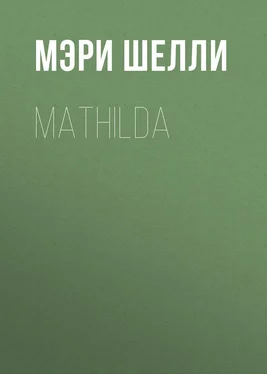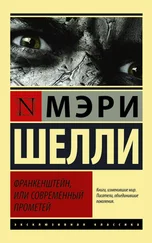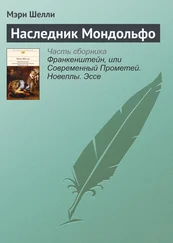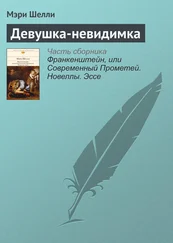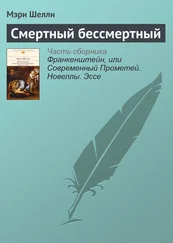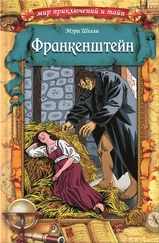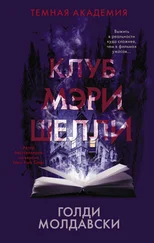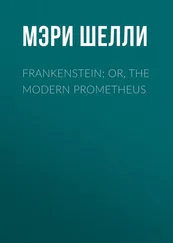Мэри Шелли - Mathilda
Здесь есть возможность читать онлайн «Мэри Шелли - Mathilda» — ознакомительный отрывок электронной книги совершенно бесплатно, а после прочтения отрывка купить полную версию. В некоторых случаях можно слушать аудио, скачать через торрент в формате fb2 и присутствует краткое содержание. Жанр: literature_19, foreign_antique, foreign_prose, на английском языке. Описание произведения, (предисловие) а так же отзывы посетителей доступны на портале библиотеки ЛибКат.
- Название:Mathilda
- Автор:
- Жанр:
- Год:неизвестен
- ISBN:нет данных
- Рейтинг книги:3 / 5. Голосов: 1
-
Избранное:Добавить в избранное
- Отзывы:
-
Ваша оценка:
- 60
- 1
- 2
- 3
- 4
- 5
Mathilda: краткое содержание, описание и аннотация
Предлагаем к чтению аннотацию, описание, краткое содержание или предисловие (зависит от того, что написал сам автор книги «Mathilda»). Если вы не нашли необходимую информацию о книге — напишите в комментариях, мы постараемся отыскать её.
Mathilda — читать онлайн ознакомительный отрывок
Ниже представлен текст книги, разбитый по страницам. Система сохранения места последней прочитанной страницы, позволяет с удобством читать онлайн бесплатно книгу «Mathilda», без необходимости каждый раз заново искать на чём Вы остановились. Поставьте закладку, и сможете в любой момент перейти на страницу, на которой закончили чтение.
Интервал:
Закладка:
As I grew older my liberty encreased with my desires, and my wanderings extended from our park to the neighbouring country. Our house was situated on the shores of the lake and the lawn came down to the water's edge. I rambled amidst the wild scenery of this lovely country and became a complete mountaineer: I passed hours on the steep brow of a mountain that overhung a waterfall or rowed myself in a little skiff to some one of the islands. I wandered for ever about these lovely solitudes, gathering flower after flower singing as I might the wild melodies of the country, or occupied by pleasant day dreams. My greatest pleasure was the enjoyment of a serene sky amidst these verdant woods: yet I loved all the changes of Nature; and rain, and storm, and the beautiful clouds of heaven brought their delights with them. When rocked by the waves of the lake my spirits rose in triumph as a horseman feels with pride the motions of his high fed steed.
Ond' era pinta tutta la mia via 31 31 Dante
But my pleasures arose from the contemplation of nature alone, I had no companion: my warm affections finding no return from any other human heart were forced to run waste on inanimate objects. 32 32 The description of Mathilda's love of nature and of animals is elaborated from both rough drafts. The effect, like that of the preceding addition (see note 11), is to emphasize Mathilda's loneliness. For the theme of loneliness in Mary Shelley's work, see Nitchie, Mary Shelley , pp. 13-17.
Sometimes indeed I wept when my aunt received my caresses with repulsive coldness, and when I looked round and found none to love; but I quickly dried my tears. As I grew older books in some degree supplied the place of human intercourse: the library of my aunt was very small; Shakespear, Milton, Pope and Cowper were the strangley [ sic ] assorted poets of her collection; and among the prose authors a translation of Livy and Rollin's ancient history were my chief favourites although as I emerged from childhood I found others highly interesting which I had before neglected as dull.
When I was twelve years old it occurred to my aunt that I ought to learn music; she herself played upon the harp. It was with great hesitation that she persuaded herself to undertake my instruction; yet believing this accomplishment a necessary part of my education, and balancing the evils of this measure or of having some one in the house to instruct me she submitted to the inconvenience. A harp was sent for that my playing might not interfere with hers, and I began: she found me a docile and when I had conquered the first rudiments a very apt scholar. I had acquired in my harp a companion in rainy days; a sweet soother of my feelings when any untoward accident ruffled them: I often addressed it as my only friend; I could pour forth to it my hopes and loves, and I fancied that its sweet accents answered me. I have now mentioned all my studies.
I was a solitary being, and from my infant years, ever since my dear nurse left me, I had been a dreamer. I brought Rosalind and Miranda and the lady of Comus to life to be my companions, or on my isle acted over their parts imagining myself to be in their situations. Then I wandered from the fancies of others and formed affections and intimacies with the aerial creations of my own brain – but still clinging to reality I gave a name to these conceptions and nursed them in the hope of realization. I clung to the memory of my parents; my mother I should never see, she was dead: but the idea of [my] unhappy, wandering father was the idol of my imagination. I bestowed on him all my affections; there was a miniature of him that I gazed on continually; I copied his last letter and read it again and again. Sometimes it made me weep; and at other [times] I repeated with transport those words, – "One day I may claim her at your hands." I was to be his consoler, his companion in after years. My favourite vision was that when I grew up I would leave my aunt, whose coldness lulled my conscience, and disguised like a boy I would seek my father through the world. My imagination hung upon the scene of recognition; his miniature, which I should continually wear exposed on my breast, would be the means and I imaged the moment to my mind a thousand and a thousand times, perpetually varying the circumstances. Sometimes it would be in a desart; in a populous city; at a ball; we should perhaps meet in a vessel; and his first words constantly were, "My daughter, I love thee"! What extactic moments have I passed in these dreams! How many tears I have shed; how often have I laughed aloud. 33 33 This paragraph is a revision of F of F – B , which is fragmentary. There is nothing in F of F – A and only one scored-out sentence in S-R fr . None of the rough drafts tells of her plans to join her father.
This was my life for sixteen years. At fourteen and fifteen I often thought that the time was come when I should commence my pilgrimage, which I had cheated my own mind into believing was my imperious duty: but a reluctance to quit my Aunt; a remorse for the grief which, I could not conceal from myself, I should occasion her for ever withheld me. Sometimes when I had planned the next morning for my escape a word of more than usual affection from her lips made me postpone my resolution. I reproached myself bitterly for what I called a culpable weakness; but this weakness returned upon me whenever the critical moment approached, and I never found courage to depart. 34 34 The final paragraph in Chapter II is entirely new.
CHAPTER III
It was on my sixteenth birthday that my aunt received a letter from my father. I cannot describe the tumult of emotions that arose within me as I read it. It was dated from London; he had returned! 35 35 The account of the return of Mathilda's father is very slightly revised from that in F of F – A . F of F – B has only a few fragmentary sentences, scored out. It resumes with the paragraph beginning, "My father was very little changed."
I could only relieve my transports by tears, tears of unmingled joy. He had returned, and he wrote to know whether my aunt would come to London or whether he should visit her in Scotland. How delicious to me were the words of his letter that concerned me: "I cannot tell you," it said, "how ardently I desire to see my Mathilda. I look on her as the creature who will form the happiness of my future life: she is all that exists on earth that interests me. I can hardly prevent myself from hastening immediately to you but I am necessarily detained a week and I write because if you come here I may see you somewhat sooner." I read these words with devouring eyes; I kissed them, wept over them and exclaimed, "He will love me!" —
My aunt would not undertake so long a journey, and in a fortnight we had another letter from my father, it was dated Edinburgh: he wrote that he should be with us in three days. "As he approached his desire of seeing me," he said, "became more and more ardent, and he felt that the moment when he should first clasp me in his arms would be the happiest of his life."
How irksome were these three days to me! All sleep and appetite fled from me; I could only read and re-read his letter, and in the solitude of the woods imagine the moment of our meeting. On the eve of the third day I retired early to my room; I could not sleep but paced all night about my chamber and, as you may in Scotland at midsummer, watched the crimson track of the sun as it almost skirted the northern horizon. At day break I hastened to the woods; the hours past on while I indulged in wild dreams that gave wings to the slothful steps of time, and beguiled my eager impatience. My father was expected at noon but when I wished to return to me[e]t him I found that I had lost my way: it seemed that in every attempt to find it I only became more involved in the intracacies of the woods, and the trees hid all trace by which I might be guided. 36 36 Symbolic of Mathilda's subsequent life.
I grew impatient, I wept; [ sic ] and wrung my hands but still I could not discover my path.
Интервал:
Закладка:
Похожие книги на «Mathilda»
Представляем Вашему вниманию похожие книги на «Mathilda» списком для выбора. Мы отобрали схожую по названию и смыслу литературу в надежде предоставить читателям больше вариантов отыскать новые, интересные, ещё непрочитанные произведения.
Обсуждение, отзывы о книге «Mathilda» и просто собственные мнения читателей. Оставьте ваши комментарии, напишите, что Вы думаете о произведении, его смысле или главных героях. Укажите что конкретно понравилось, а что нет, и почему Вы так считаете.
